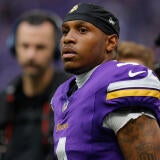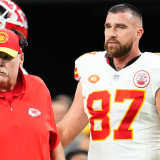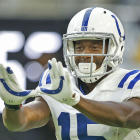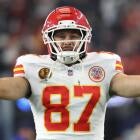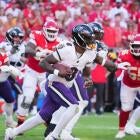The Patriots, Seahawks and Steelers get richer in the NFL's buy-low trade market
The current CBA makes it easy for elite teams to gamble on draft busts instead of losing out in waivers

The rookie wage scale in the latest collective bargaining agreement between the NFL and the players association remains a topic of contention for some in the industry, and the consequences -- intended or otherwise -- are still ripe for debate.
But what's undeniable is that by making young players more of a fixed cost, with dramatically less guaranteed money than had been the norm and much more manageable contracts, it has stimulated a fairly robust trade market. In the past, if a top pick looked like a bust and was faltering after a couple of seasons, teams were more or less stuck with him. The contract -- remember, guys like Matthew Stafford came into the league with $60M guaranteed before they ever threw a pass -- served as an albatross for player and team alike and made it difficult for either side to move on.
No one else wanted to assume those same contracts, even if another team thought that young pro could improve in its roster. It might require complicated negotiations to move money around or alter the contract to facilitate a trade and it wasn't worth the effort in many cases. So it prevented the player from getting a fresh start elsewhere until the deal expired or he was released, and in the meantime the team that drafted him -- but didn't need him anymore -- was stuck, too.
That's hardly the case anymore, and especially for some of the smarter and more successful franchises in the NFL it has become a science trying to acquire such candidates via trade. Instead of picking way down in the selection order for the waiver wire, which is the destination for jettisoned draft busts this time of year, the smart teams are jumping the line and making trades.
The struggling player is eager for a new chance with a new regime -- and in the cases of the Patriots, Seahawks and Steelers, who have been very active on the trade market -- they're going to a winning organization that knows a thing or two about player development. And the Steelers, Patriots and Seahawks know that if they merely wait to make a waiver claim on a former top pick who could be released, well, someone else ahead of them is going to land him first. And they also know that, with such stocked winning rosters, those future fifth-round picks, or whatever, are hardly a guarantee to make their team, anyway.
Those teams trust their evaluations of the player coming out of college, they do their homework, they identify a limited role in which they think the player can thrive and they generally don't ask him to do too much. The player doesn't have to feel like the savior anymore, the pressure is off, and that new team didn't draft him and hasn't already sunk money into him. The new team has made only a limited risk to land him, so there aren't the constant questions about why his career hasn't gone according to plan.
And on the other side of the ledger, this cost certainty has empowered new young regimes, like the one in Buffalo, to weed out players who won't be there long-term and dig out from the personnel decisions of their predecessors quite quickly. In just a matter of weeks the new Bills regime of GM Brandon Beane and coach Sean McDermott has parted with a handful of recent high picks made before their arrival without handicapping their salary cap and without having to do any contract gymnastics. They shipped out Sammy Watkins, Ronald Darby, Reggie Ragland and Cardale Jones for draft compensation and got back a player in Jordan Matthews, from Philadelphia, who wasn't living up to his draft billing with the Eagles and could use new digs himself.
Of course, it's hardly foolproof and it doesn't always work. Case in point: there were only losers in the Jonathan Baldwin for A.J. Jenkins swap of first-round busts in 2013 that the Chiefs and 49ers made. But the reasoning is sound, and in general, it's a positive for all sides. The team trading away the player at least gets something for him (he would have netted them just a comp pick if they let him play out his contract and eventually leave as a free agent), the player gets a fresh start and his new team has another toy to play with in the upcoming season.
The Patriots have made a cottage industry out of these sorts of buy-low propositions. Last year it was guys like Barkevious Mingo and Kyle Van Noy. A few years before that it was linebacker Akeem Ayers. This time around they landed receiver Phillip Dorsett, a speedy but erratic former first-round pick of the Colts, in return for their third-string quarterback, Jacoby Brissett, a recent second-day pick himself. And this is a good thing for all involved.
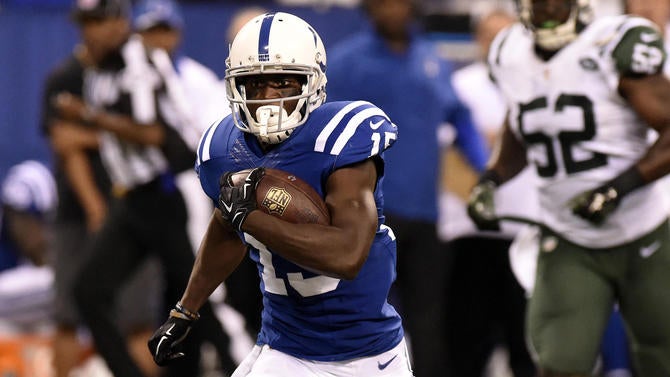
The Pats lose Julian Edelman for the year, and still remained deep at receiver, but now they have more insurance. With Brandin Cooks in the fold and Chris Hogan and Malcolm Mitchell home-run hitters as well, they have become much more of a deep ball team, and Dorsett has the speed to get anywhere on the field. If someone else goes down they don't have to revamp their offense on the fly.
For Dorsett, he gets to catch balls from the greatest quarterback ever at a time when the Colts don't know when their starter, Andrew Luck, is going to be able to play. With former Colts GM Ryan Grigson, the guy that drafted him, already fired in Indy, now is a good time for him to get out as well. And Brissett isn't trapped behind two QBs in Indy like he was in New England. Luck's health makes him a concern in the short term and Brissett may end up seeing more playing time.
I get it, all the way around. It might not end up changing the fortunes of either team, but the Pats aren't going to get Dorsett on waivers, and the move just might help both teams. A year ago the Steelers bought low on former Browns bust Justin Gilbert. This time around they parted with Sammie Coates -- the rare receiver they took high in the draft who wasn't panning out and who was stuck behind a bunch of stars -- with the needy Browns taking a chance on him. And moving corner Ross Cockrell made sense after trading for Joe Haden from the Browns last week. Those deals came together in a matter of minutes, with the ease of moving these contracts an afterthought now.
And the Seahawks made potentially the biggest trade of them all by landing Sheldon Richardson from the Jets for Jermaine Kearse and a second-round pick. Richardson, still just 26, taken 13th overall in 2013, fits directly into this model. His attitude and off-field incidents and desire for a mega-contract and fractured relationships with Jets players and staff alike all left New York with one real option -- get something for him while you can. Despite all his talent and his ability to take over games when he's truly motivated to do so, there were too many incidents and too much concern over what a future suspension might mean to ever give Richardson big money in New York, and the Jets knew they had to move on.

Even with Richardson, and even if he stayed out of trouble and didn't grate on the people around him and didn't bemoan his lack of a new contract and played to his abilities (all big ifs), the Jets were still going to finish near the bottom of the NFL and be in line for a top three pick. And with his fifth-year option still manageable enough ($8M) after he played out four years for just $10M total, he remained a commodity that could be shipped out in trade without complications.
The Seahawks, who have repeatedly been contenders and have a great front four rotation and routinely win despite a collection of outsized personalities and quirky characters, know how to handle players like this. They don't have to pay any extra cash to incentivize Richardson. They know he's playing for his next contract. Did they give up a lot by dealing Kearse and the second-round pick? Maybe, but Kearse wasn't making their team and a year ago they traded down repeatedly out of the first round and down in the second round. In Super Bowl or bust mode, that future pick doesn't mean as much to them and they do some of their best draft work in the middle rounds anyway, and that pick is likely to be around 60th overall anyway.
This, once again, makes sense to me for all parties involved (Kearse won't have good quarterback play but he'll see way more targets as a potential starter for the Jets than he ever would've in Seattle), and these moves become more seamless because of the relatively limited finances involved. It's difficult to assume a mega-contract this close to the season, but these youngsters aren't getting that kind of coin anymore.
I was already calling for a Seahawks-Patriots Super Bowl at the start of training camp, and nothing those teams have done since then to get to their 53-man rosters has made me reconsider that pick (not that it's exactly going out on a limb). I suspect the rich get richer, and the better teams in the league have helped themselves at least a little with their recent acquisitions.


